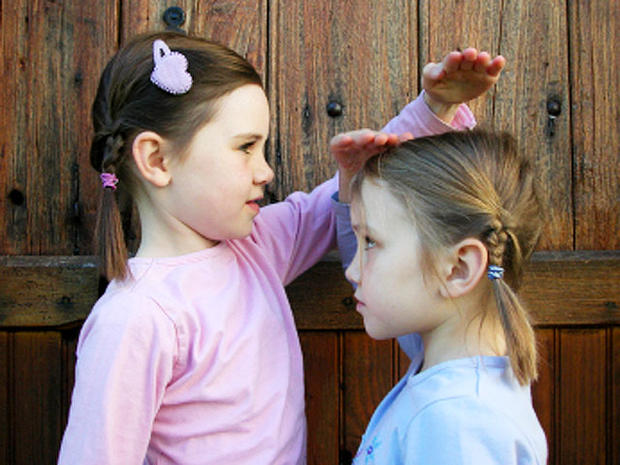Kids of moms who had postpartum depression more likely to be short by age 5
(CBS News) It's no secret that your height may be influenced by your parents. But, new research suggests a mother's emotional state after giving birth may also contribute to a child's height.
A study found that kids of mothers who had postpartum depression were more likely to be shorter than their classmates.
Antidepressants during pregnancy change baby's head size, but so does depression: Study
Pictures: 12 crazy myths about pregnancy
"Mothers with higher levels of depressive symptoms in the first year postpartum were more likely to have children who were shorter in stature in preschool and kindergarten age," study author Dr. Pamela Surkan, assistant professor at the Johns Hopkins Bloomberg School of Public Health, in Baltimore, said to HealthDay. "This study points to another reason why it's really important for mothers to get help for depression during the postpartum period."
Postpartum depression involves moderate to severe depression after a woman gives birth, occurring most often within the first three months after delivery, according to the " >National Institutes of Health (NIH)> Feelings of anxiety, irritation, tearfulness, and restlessness are common in the week or two after pregnancy. These feelings, sometimes called the "baby blues," almost always go away shortly after without treatment but postpartum depression may occur when the feelings do not fade away or when signs of depression start 1 or more months after childbirth.
For the new study, published Sept. 10 in Pediatrics, researchers reviewed nationally representative birth data on more than 6,500 kids to determine if mom's depression nine months after giving birth negatively affected a child's growth after his or her third birthday.>
They found that children of moms with mild to moderate or severe depression were 40 percent more likely to have a child below the tenth percentile in height by the time he or she was 4 years old and 48 percent more likely by the time the child turned 5 years old. Maternal depression was not tied to deficits in children's weight at these ages.
The study does not show cause and effect, but postpartum depression has been linked to a shorter duration of breast-feeding, attachment issues along and increased stress in kids, all of which all could affect growth. The researchers say early detection and treatment of postpartum depression with efforts focusing on prevention may prevent delays in child growth among young kids.
Surkan noted to HealthDay that if you have short parents, genetically you're supposed to be in the tenth percentile in height and that is normal.
"But if the reason you're in the 10th percentile is because you lacked nutrition or because you had a number of illnesses over the course of your early childhood that weren't treated properly, that is a problem," she said.
New mothers with postpartum depression should get help right away, according to the NIH. They are encouraged to ask their partner, family and friends to help with the baby's needs in the home, to be open with their feelings, make time to go out and visit friends or spend alone time with their partner, get lots of rest and not try to do too much or be perfect.
Treatments may include a combination of medication and or therapy.
Commenting on the study to NBCNews.com, Dr. Andrew Leuchter, professor of psychiatry at UCLA, said, "It's more evidence that depression in the mom can have negative health effects on the kids. So it really underlines the urgency of treating depression in these mothers so the kids don't suffer."

